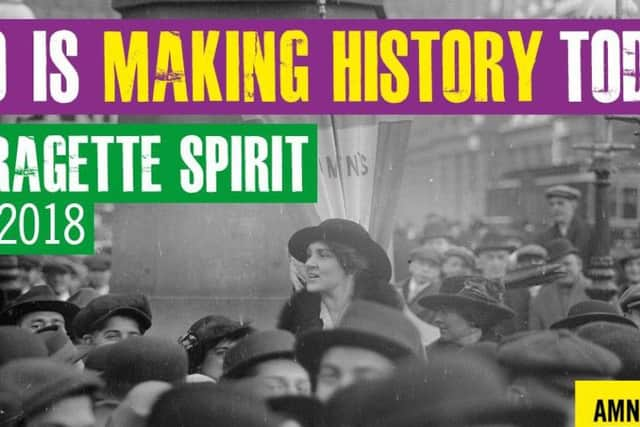Doncaster marks 100 year anniversary of women being given right to vote


To mark the anniversary The Doncaster Free Press has teamed up with Amnesty International to launch a campaign to find modern women who have 'Suffragette spirit' and have fought for human rights in their communities.
Don Valley MP Caroline Flint explains Doncaster's role in the suffragettes' campaign below and why votes for women are so important.


Advertisement
Hide AdAdvertisement
Hide AdFebruary 6 2018 marked the 100th anniversary of the day women were given the right to vote.
The Representation of the People Act, passed in 1918, gave women over 30 and "of property" the vote.
It is easy to forget it took decades of campaigning and a world war to propel women into polling stations. Almost every year, from the first petition in 1866 to 1918, Parliament received petitions or Bills seeking votes for women.
Finally, Parliament voted by 385 to 55 to give some women the vote. The largemargin of support masked the struggle that was waged for decades.


Advertisement
Hide AdAdvertisement
Hide AdEmmeline Pankhurst and Millicent Fawcett, who led the campaign for women’s suffrage, are now famous. A statue to Fawcett will be unveiled in Parliament square. But Doncaster women were part of it too.
In 1908, the Doncaster organiser of the Doncaster Women’s Social and Political Union, Lina Lambert, held a public meeting in Doncaster Market Place. The hostility they faced became so violent, they had to seek refuge in a furniture shop. The following night, their meeting was all but broken up by groups of men.
An open air meeting addressed by Adela Pankhurst was met with such disruption, the police had to escort Pankhurst to her lodgings in Printing Office Street.
Some in the suffrage movement, like the Doncaster Women’s Social and Political Union, supported direct action. Lina Lambert appeared in court in Leeds in October 1908, having caused disturbances during a visit by Prime Minister, Herbert Asquith. Refusing to be bound over, the women were sent to jail for five days.
Advertisement
Hide AdAdvertisement
Hide AdIn 1913, suffragettes were accused of trying to blow up Wheatley Hall and Lilian Lenton pleaded guilty to trying to blow up Westfield House in Balby.She was jailed and released after going on hunger strike. Several Doncaster suffragettes were jailed and went on the run from police.
The 1918 Act enabled 8.5million women over 30 who owned property, or who were married to a registered elector, to vote; a restriction to ensure that women would not outnumber men. Within months, an Act allowed women to stand for Parliament.
I was elected in 1997, only the 201 st female MP ever. Knocking on doors in Don Valley, I’ve met women whose mothers and grandmothers were suffragettes.
Women holding hands with history. I stand on the shoulders of brave women who faced violence, imprisonment and risk to life to secure my right to vote. I hope the anniversary reminds every woman of why they should vote. Women’s votes mattered in 1918. They still do today.
Advertisement
Hide AdAdvertisement
Hide AdHOW TO NOMINATE: To nominate an amazing woman your local area, please visit www.amnesty.org.uk/suffragettespirit. All women must have carried out work to help others their local area within the last 10 years. All successful nominees will be contacted to give consent prior to being placed on the Suffragette Spirit Map of Britain. This campaign has been funded by People’s Postcode Lottery.